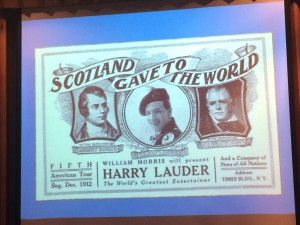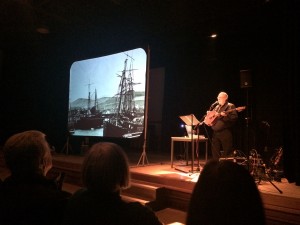On January 29 the University of Dundee Fulbright Legacy programme, the Arts and Humanities Research Institute, the Centre for Scottish Culture, and Archives & Information were partners in a two-part evening featuring an illustrated lecture and a compelling performance exploring 400 years of musical traditions, innovations, and transatlantic exchanges that have mutually enriched the cultures of the United States and Scotland.
TRANSATLANTIC NOTES: THE UNITED STATES, SCOTLAND & POPULAR SONG
Nancy Groce, American Folklife Center, Library of Congress, Washington, DC
 From the 17th century when Scottish immigrants arrived on the shores of the present day United States, to the 18th when Robert Burns composed “Virginia, -ginia, O,” to the 19th when American music first began to influence Scottish culture, to more recent years when Michael Marra celebrated “General Grant’s Visit to Dundee,” the musical histories of Scotland and America have been frequently intertwined.
From the 17th century when Scottish immigrants arrived on the shores of the present day United States, to the 18th when Robert Burns composed “Virginia, -ginia, O,” to the 19th when American music first began to influence Scottish culture, to more recent years when Michael Marra celebrated “General Grant’s Visit to Dundee,” the musical histories of Scotland and America have been frequently intertwined.
America, both real and imaginary, has served as a muse for some of Scotland’s greatest composers, and American songwriters have found continuing inspiration in Scotland and Scottish culture. On both sides of the Atlantic, these exchanges have often been informed in equal parts by history, fantasy, and stereotypes.
In this illustrated lecture, Dr. Groce touched on some of the significant musical exchanges between Scotland and American over the past 400 years—some of them well-known and others largely forgotten—that helped shape how Scots and Americans understood and continue to understand (or misunderstand) each other’s cultures through perceptions reflected in and shaped by popular song.
Ethnomusicologist and folklorist, Nancy Groce, is a Senior Folklife Specialist at the Library of Congress’s American Folklife Center in Washington, D.C. Dr. Groce has published widely on American music and American culture and has a long-standing interest in Scottish music. During her previous post at the Smithsonian Institution she served as curator for the 2003 ‘Scotland at the Smithsonian Festival’.
THE BACK O’ THE NORTH WIND: TALES OF SCOTS IN AMERICA
Brian McNeill, one of Scotland’s top folk musicians and founder of Battlefield Band
 A career spanning more than 40 years has established composer and multi-instrumentalist Brian McNeill as one of the most acclaimed forces in contemporary Scottish music. Described as ‘Scotland’s most meaningful contemporary songwriter’ by The Scotsman, Brian’s credits include membership of some of Scotland’s most influential bands, including the Battlefield Band (which he founded in 1969) and Clan Alba; six years as Head of Scottish Music at the Royal Scottish Academy of Music and Drama; work as a prominent music producer, teacher, and musical director and innumerable appearances as a soloist and headliner at major concert halls and festivals around the world. Many of his songs—including The Yew Tree, Lads O’ The Fair, The Snows of France and Holland, and No Gods and Precious Few Heroes —have become classics on both sides of the Atlantic.
A career spanning more than 40 years has established composer and multi-instrumentalist Brian McNeill as one of the most acclaimed forces in contemporary Scottish music. Described as ‘Scotland’s most meaningful contemporary songwriter’ by The Scotsman, Brian’s credits include membership of some of Scotland’s most influential bands, including the Battlefield Band (which he founded in 1969) and Clan Alba; six years as Head of Scottish Music at the Royal Scottish Academy of Music and Drama; work as a prominent music producer, teacher, and musical director and innumerable appearances as a soloist and headliner at major concert halls and festivals around the world. Many of his songs—including The Yew Tree, Lads O’ The Fair, The Snows of France and Holland, and No Gods and Precious Few Heroes —have become classics on both sides of the Atlantic.
In keeping with the evening’s focus on Scottish-American cultural exchanges, Brian performed his song cycle The Back O’ The North Wind, commemorating Scottish emigration to America. Subtitled Tales of the Scots in America, this fine collection of stories, songs and tunes is inspired by Scots men and women—some well known, such as Flora MacDonald, others obscure, such as Brian’s own great uncle —who found their way to North America. Some ended up in Canada, some in the United States, but all have been immortalised in Brian’s music. (This song cycle has been particularly influential in the United States, where it has helped increase awareness of Scottish contributions to American culture.) Augmented by hundreds of images and Brian’s skills as a master storyteller, The Back O’ The North Wind was a memorable and enjoyable performance.

Comments are closed.